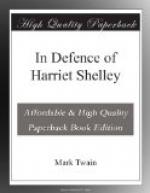One must be allowed to assist himself with conjectures like these when trying to find his way through a literary swamp which has so many misleading finger-boards up as this book is furnished with.
We have now arrived at a part of the swamp where the difficulties and perplexities are going to be greater than any we have yet met with— where, indeed, the finger-boards are multitudinous, and the most of them pointing diligently in the wrong direction. We are to be told by the biography why Shelley deserted his wife and child and took up with Cornelia Turner and Italian. It was not on account of Cornelia’s sighs and sentimentalities and tea and manna and late hours and soft and sweet and industrious enticements; no, it was because “his happiness in his home had been wounded and bruised almost to death.”
It had been wounded and bruised almost to death in this way:
1st. Harriet persuaded him to set up a carriage.
2d. After the intrusion of the baby, Harriet stopped reading aloud and studying.
3d. Harriet’s walks with Hogg “commonly conducted us to some fashionable bonnet-shop.”
4th. Harriet hired a wet-nurse.
5th. When an operation was being performed upon the baby, “Harriet stood by, narrowly observing all that was done, but, to the astonishment of the operator, betraying not the smallest sign of emotion.”
6th. Eliza Westbrook, sister-in-law, was still of the household.
The evidence against Harriet Shelley is all in; there is no more. Upon these six counts she stands indicted of the crime of driving her husband into that sty at Bracknell; and this crime, by these helps, the biographical prosecuting attorney has set himself the task of proving upon her.
Does the biographer call himself the attorney for the prosecution? No, only to himself, privately; publicly he is the passionless, disinterested, impartial judge on the bench. He holds up his judicial scales before the world, that all may see; and it all tries to look so fair that a blind person would sometimes fail to see him slip the false weights in.
Shelley’s happiness in his home had been wounded and bruised almost to death, first, because Harriet had persuaded him to set up a carriage. I cannot discover that any evidence is offered that she asked him to set up a carriage. Still, if she did, was it a heavy offence? Was it unique? Other young wives had committed it before, others have committed it since. Shelley had dearly loved her in those London days; possibly he set up the carriage gladly to please her; affectionate young husbands do such things. When Shelley ran away with another girl, by-and-by, this girl persuaded him to pour the price of many carriages and many horses down the bottomless well of her father’s debts, but this impartial judge finds no fault with that. Once she appeals to Shelley to raise money— necessarily by borrowing, there was no other way—to pay her father’s debts with at a time when Shelley was in danger of being arrested and imprisoned for his own debts; yet the good judge finds no fault with her even for this.




